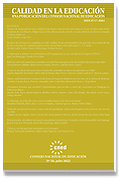Form Teachers, a Key Actor for Students in Pandemic. Case Study in Six Public Secondary Schools in Santiago
DOI:
https://doi.org/10.31619/caledu.n56.1169Keywords:
COVID-19 pandemic, form teachers, homeroom teachers, students, trust, public secondary schoolsAbstract
The pandemic generated by the COVID-19 virus has had a strong impact in schools. A study about the relational environment in six public schools in the Metropolitan Region reported the relevance of the role played by form teachers during the period of the COVID-19 pandemic, adapting to the needs of the current crisis context and achieving higher levels of trust with their students. The aim of this article was to deepen in the characteristics and tasks performed by the role of form teachers, showing how trust between teachers and students has increased. Through the case study methodology, interviews were conducted with teachers (form and class teachers), students and school leaders. The interviews were conducted in two phases: 2020 and 2021. Our results indicate that form teachers have assumed four main tasks during this period: i) monitoring and follow-up of connectivity and participation; ii) accompaniment of the formative process and learning; iii) promotion of psycho-emotional well-being; and iv) assistance with socio-economic problems. The higher level of trust reported between students and their form teachers is mainly based on three dimensions of trust: benevolence, predictability and receptiveness.
Downloads
Published
Issue
Section
License
Authors retain their Copyright and only transfer a part of these to the journal, accepting the following conditions:
Authors keep their rights as authors and guarantee the right to the journal for the first publication of their work, which is simultaneously subject to the Creative Commons Attribution license allowing third parties to share the study accrediting the author and first publication in this journal.
Authors may adopt other non-exclusive license agreements for distribution of the version of the published work (e.g. inclusion in an institutional thematic file or publication in a monographic volume) accrediting initial publication in this journal.
Authors are allowed and recommended to share their work over the Internet (e.g. in institutional telematic files or their website) before and during the submission process, which may lead to interesting exchanges and increased citation of the published work. (See The effect of open access).

